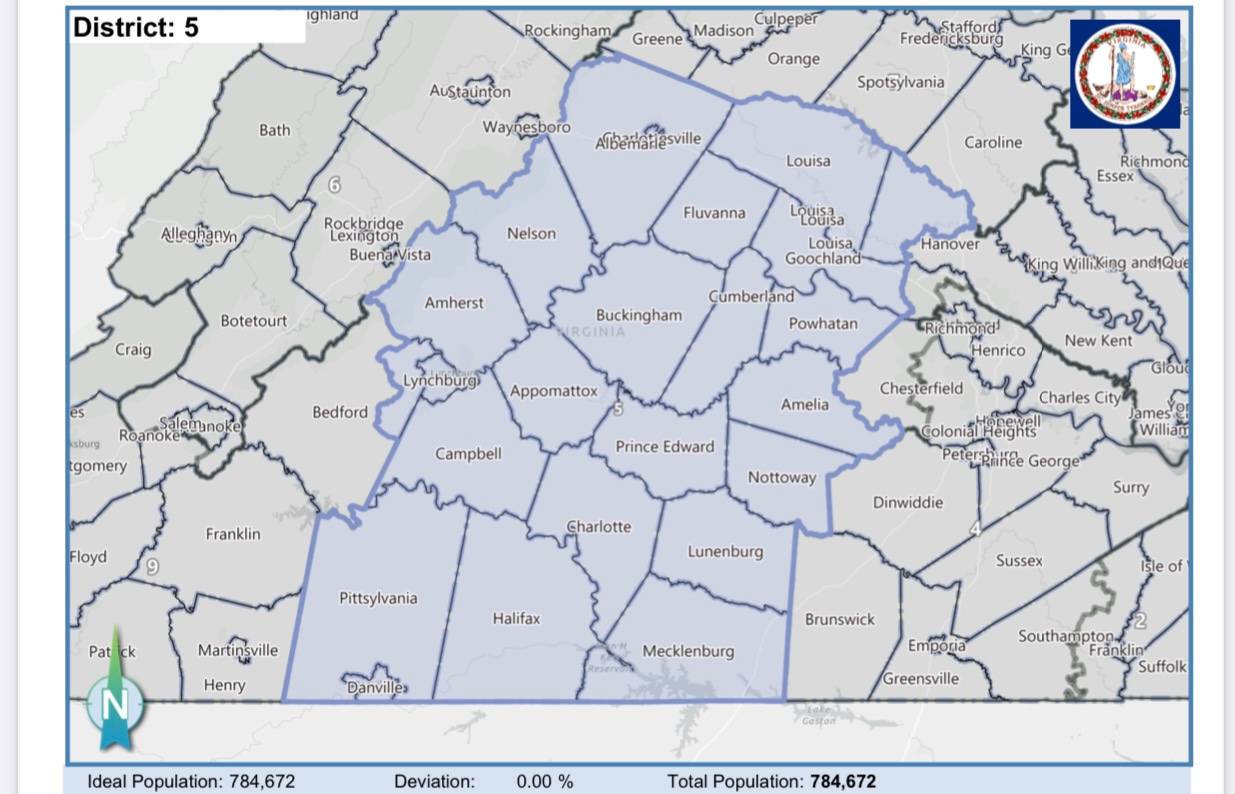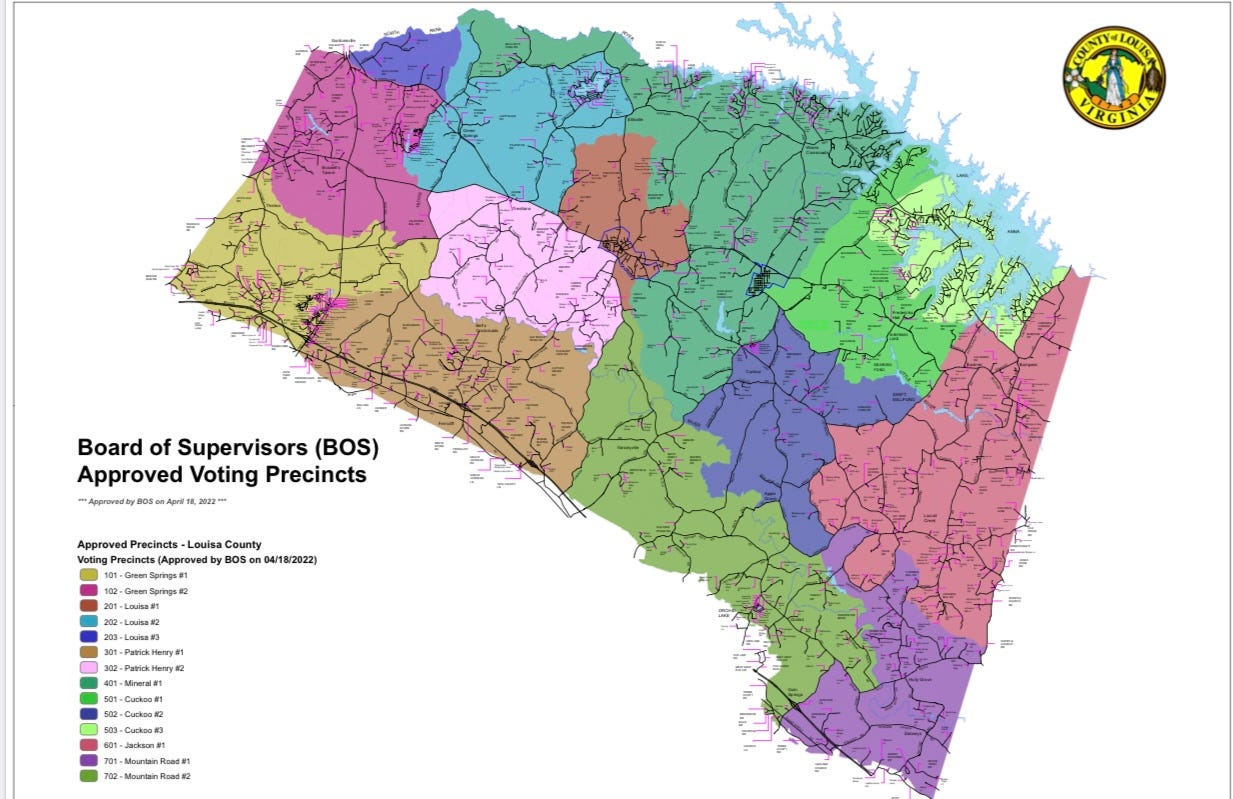Quiet coming week in county government; Ballot set for upcoming elections
Engage Louisa is a community newsletter aimed at keeping folks informed about Louisa County government. It’s free, non-partisan, and powered by volunteers. We believe our community is stronger and our government serves us better when we increase transparency, accessibility, and engagement.
Quiet coming week in county government
For the latest information on county meetings including public meetings of boards, commissions, authorities, work groups, and internal county committees, click here.
At publication time, Louisa County isn’t advertising any public meetings for the coming week, a brief reprieve just before Labor Day, the unofficial end of summer. Next week, both the Board of Supervisors and Planning Commission will meet, holding a combined nine public hearings.
Other meetings:
Thursday, September 1
Thomas Jefferson Planning District Commission, 407 E. Water Street, Charlottesville, 7 pm. A link to watch/participate virtually is available in the meeting materials. (meeting materials)
Additional information about Louisa County’s upcoming public meetings is available here.
Interested in taking your talents to one of the county’s numerous boards and commissions? Find out more here, including which boards have vacancies and how to apply.
Ballot set for upcoming elections
With early voting kicking off in less than a month, the ballot for this November’s election is finally set. And, for most Louisa County residents, it’s a short one.
In early August, the Louisa County Board of Supervisors pulled the plug on a proposed referendum that would’ve sought voters’ permission to issue millions of dollars in debt to fund upgrades to county-owned sports fields and a federal court threw out a lawsuit asking for new House of Delegates elections this year. That means many Louisa voters will go to the polls this fall with only one contest on their ballot: they’ll choose who they want to represent the newly drawn 5th Congressional District in the House of Representatives.
Beyond the congressional race, some Louisa voters will have a few more decisions to make, getting a chance to weigh in on local contests. Residents in the Mineral District will choose their representative on the Louisa County School Board in a special election and voters in the Towns of Louisa and Mineral will elect a mayor and members of town council.
Thanks to the decennial redistricting process, many Louisa voters will find themselves casting ballots at new polling locations this November as local voting districts, like those at the state and federal level, were reconfigured based on results from the 2020 census.
Check out Engage Louisa’s roundup of what’s on the ballot this year and other pertinent voter information.
5th District congressional race
Voters will choose between a pair of candidates vying to represent Louisa County and the rest of the 5th Congressional District in Washington: incumbent Republican Bob Good and his Democratic challenger, Josh Throneburg. The two men differ in style and substance.
Good, a Campbell County resident and former Liberty University athletics fundraiser, is seeking his second term in Congress. During his rapid rise from local elected official to the national stage, he’s positioned himself on his party’s far right and hasn’t shied away from taking on Democrats or his fellow Republicans.
In 2020, Good ousted incumbent Republican Denver Riggleman in a drive-through convention to win his party’s nomination, riding a wave of anger among grassroots activists miffed that Riggleman officiated a same-sex wedding and unconvinced of his conservative credentials. Good went on to beat Democrat Cameron Webb by about five points in the general election.
Since arriving in Washington, Good has refused to budge on his conservative principles, joining the House Freedom Caucus, an ultra-conservative voting bloc, and ranking among the five least bipartisan House members, according to an annual report jointly published by the nonpartisan Lugar Center and Georgetown University’s McCourt School of Public Policy.
On his campaign website, Good brands himself a “constitutional conservative” and staunch defender of “our nation’s founding Judeo-Christian principles.” He warns of the threat of what he calls “unfettered and unchecked immigration,” pledging support for a wall along the southern border, champions “the right to keep and bear arms” as a critical check on government power, and advocates for an end to abortion “without exception.”
On fiscal policy and the economy, Good sounds the alarm about what he terms “reckless spending that is bankrupting our nation,” advocating for cutting taxes, slashing regulations, and trimming the federal budget.
“The primary key to sustained economic growth is very simple: take less of our citizens’ hard-earned resources, and let them control how their money is spent, saved, or invested. Continuing to reduce regulations on businesses and eliminating useless red tape, while empowering the American entrepreneurial spirit, is crucial for economic freedom and prosperity,” he said on his website.
Good has sponsored several bills aimed at shrinking spending and cutting regulations including the “Nickel Plan Act,” which would mandate that the federal government reduce spending by one nickel for every dollar it spends, and the “No Regulation Through Litigation Act,” which would restrict the ability to produce regulations through settlements between federal agencies and advocacy groups. Neither bill has advanced out of committee in the Democratic-controlled House.
A former member of the Campbell County Board of Supervisors, Good isn’t afraid to wade into local issues, particularly involving public education, a key battleground for conservative activists over the last several years.
He pushed back against mask mandates in local schools during the height of the Covid-19 pandemic and introduced legislation to ban the teaching of critical race theory, a college-level framework not included in Virginia’s K-12 curriculum. Opposition to the academic theory, which focuses on systemic racism, emerged as a key theme in Governor Glenn Youngkin’s successful gubernatorial run last fall.
At a recent Campbell County supervisors’ meeting, Good said that he supported placing cameras in every classroom to guard against what he calls “leftist indoctrination” in public schools.
“School boards have to know that parents are watching, their families are watching, their voters are watching and they will hold us accountable that we reflect what they want from us when we serve and represent them," Good said.
In his bid for re-election, Good is facing a political newcomer in Throneburg, a Charlottesville small business owner and ordained minister, who has branded himself as a candidate uninterested in partisan bickering and focused on, as his website puts it, leading “with the values of compassion and common sense.”
“I am running because I care about the health of our planet, our communities and our democracy, and because I know that our communities can thrive best with elected officials who are here to build up, not tear down,” Throneburg wrote in a Facebook post shortly after securing the Democratic nomination in early April.
On his campaign website, Throneburg said that he was inspired to seek the seat because of a desire to serve his community and the “fears of a father,” noting his concern for his two daughters’ future in the face of a planet in crisis, spiraling national debt, and other challenges.
An “Issues” page focuses on Throneburg’s commitment to combat climate change, which he frames as an opportunity to bring green jobs to the 5th District, improve the accessibility and affordability of healthcare, work toward racial justice, and invest in rural America.
Throneburg grew up in a small, rural farming community where the school closed the year he graduated, his website notes, and many businesses have since shuttered. He emphasizes the need to revitalize communities that have been left behind.
Specifically, Throneburg advocates for increasing federal investment in rural communities through programs that fund broadband deployment, modernize schools, and incentivize the construction and rehabilitation of affordable housing, among other initiatives.
“We can restore our network of thriving, robust rural communities and small towns, but it requires strategic investment. Rural communities feel left behind by Congress because they have been – now is the time to reinvest and make our communities whole again,” his website states.
In social media posts, Throneburg has accused Good of being out of step with the needs of his constituents. In response to Good’s push for cameras in classrooms, Throneburg suggested that Good fails to understand the issues facing many rural schools.
“Bob probably doesn't realize that many of our schools struggle to even access broadband because he's consistently voted against expanded infrastructure funding. Schools can't afford crayons, let alone high-tech streaming technology,” he said.
Throneburg and Good will face off in a new-look 5th albeit it one that remains friendly terrain for Republicans. Last December, the Virginia Supreme Court adopted new Congressional maps that move Louisa County from its current home in the 7th Congressional District to the northern edge of the 5th. The district stretches south to the North Carolina border, retaining many of the rural Southside counties that overwhelmingly supported Good in 2020. Youngkin won the district by more than 20 points last year en route to becoming the first Republican to win a governor’s race in Virginia in more than a decade.
The new 5th encompasses all or part of 24 localities across central and Southside Virginia including the cities of Charlottesville, Lynchburg, and Danville. Louisa’s nearly 38,000 residents comprise about 4.7 percent of the district.
Mineral District school board race
Two political newcomers are squaring off in a special election for the right to represent the Mineral District on the Louisa County School Board.
Lloyd Runnett and David Rogers are vying to fill the unexpired term of longtime board member Sherman Shifflett, who died in mid-February, having served more than 20 years on the board.
A third candidate, Amy Snyder, filed to run for the seat in June but dropped out of race.
After Shifflett’s passing, the board appointed Runnett to fill the seat on an interim basis, choosing him over Rogers and three other applicants. The winner of November’s election will serve through 2025.
A Louisa native whose two children attended local schools, Runnett spent much of his career working for Henrico County Fire and EMS. Since retiring in 2015, he’s taken the reins of the Louisa County Resource Council, a local nonprofit that operates a food pantry and provides other essential services to Louisa residents.
Runnett has strong ties to the school division, serving on its school safety task force since its inception in 2018 and working as an interim athletic trainer during the 2020-21 academic year. He’s partnered with educators and student groups on a variety of community projects including assisting the FFA with its annual Brunswick Stew fundraiser, working with the school’s newspaper staff to organize the yearly homecoming parade, and coordinating logistics for the Lion Pride Run, an event that annually raises thousands of dollars for scholarships.
After winning an appointment to the board in March, Runnett said he was eager to serve in honor of the many teachers who invested him including Shifflett who he called his “mentor.”
He emphasized his deep investment in the school division, as both an alumnus and community partner, and noted that, in his role at LCRC, he works with some of the county’s most economically vulnerable families, giving him a window into the struggles some students face.
“(I’m) humbled and honored to be their voice at the table regarding education in Louisa County,” he said, referencing LCRC’s clients.
Rogers, who has lived in the county since 2009, has spent more than 30 years working in the insurance industry. He’s said he’ll bring a new perspective and keen negotiating skills to the board and noted that he hopes to increase diversity and transparency in the school division.
In interviews with Engage Louisa, Rogers said that he decided to pursue the job because, as an African American, he thinks he can bring a perspective that the all-white board currently lacks. He links the body’s lack of racial diversity to the school division’s challenges hiring people of color to its faculty.
“If you want to get some strong minority candidates to come here and teach—let’s say you go to (historically Black colleges and universities) and you are looking for somebody—they don’t see anybody that looks like them, nobody that can relate to them, that can talk to them, so why would they come here,” he said.
Mineral mayor and town council
In the Town of Mineral, two candidates well known to town voters have thrown their hats in the ring for mayor: three-term incumbent Pamela Harlowe and Town Councilor Ed Jarvis.
The town has been beset by controversy over the last year with Harlowe and Jarvis at odds on key issues. Jarvis played a leading role in an effort to annul the town's charter last summer, a move that sparked backlash from Harlowe and other town residents.
Jarvis was one of five councilors who voted to censure Harlowe in April for interfering with the duties of the then-interim town manager and making disparaging remarks about him. Council rescinded the censure at its June meeting but Jarvis and two other councilors weren’t present for the vote.
Five candidates filed to run for the six seats up for grabs on council, only one of whom currently serves on the body. The field includes Ronald W. Chapman, Jr., C. Blair Nipper, Olivia Barrow McCarthy, Bernice W. Kube, and Rebecca T. “Becky” McGehee.
Nipper was appointed to council earlier this summer after Tony Henshaw resigned. Kube, who previously served several terms on council, and McGehee are the spouses of two current council members who opted not to seek re-election, Ed Kube and Roy “Snake” McGehee. Councilors Tom Runnett and David Lawson also chose not to run.
With only five candidates officially on the ballot, the town’s 330-plus registered voters will likely fill the final seat via write-in votes.
Louisa mayor and town council
In the Town of Louisa, incumbent Garland Nuckols is the only candidate in the mayor’s race while four candidates are vying for two seats on town council.
Incumbent John Jerl Purcell, IV is seeking his second term with three first-time candidates joining him in the race: former Louisa County Fire and EMS Chief Robert Dube, Tanyard resident Vicky Harte, and Donnelly Dale resident Daniel Ray Crawford. Councilor Bud Dulaney opted not to seek re-election to the five-seat board whose members serve staggered terms.
While Louisa has avoided much of the controversy embroiling its neighbor, the council race could be a spirited one as the town grapples with periodic flooding along Beaver Creek and Tanyard Branch, two waterways that run through the Tanyard subdivision on the town’s southeastern edge.
Some Tanyard residents, including Harte, blame poorly planned development for the flooding and worry that council’s recent decision to rezone 11 acres off Route 33 and Pine Ridge Drive for an up to 85-dwelling mixed-use development will only exacerbate the problem. Council voted 3-2 to approve the rezoning with Purcell moving to greenlight the request and Nuckols casting the deciding vote.
Harte has been a regular attendee at recent town and county meetings, criticizing officials for what she sees as their failure to address concerns about the flooding. She and some of her neighbors created a Facebook page to document what happens in their neighborhood after heavy rains, posting pictures and videos of rushing waters that inundate backyards and, occasionally, render one road impassable.
New voting districts, precincts, and polling places
As part of the once-a-decade redistricting process, the Board of Supervisors this spring reshaped local voting districts and the precincts that comprise them, meaning many Louisa voters will cast their ballots at new polling locations this November.
Registered voters will receive a voter information card in the mail prior to Election Day informing them of their voting districts, precinct, and polling location, according to General Registrar Cris Watkins. Anyone who has questions about where they vote is encouraged to call the Registrar’s office.
To ensure that each district’s population remains roughly equal, supervisors revamped the local map to account for significant population growth on the county’s western end, particularly in the Green Springs District, where the population grew about 23 percent over the last decade. The new map pushes several districts westward and shrinks Green Springs’ geographic footprint, moving more than 800 residents to neighboring districts.
The Patrick Henry District, which also saw its population rise, now takes in part of the old Green Spring District on the east side of Route 15 around Zion Crossroads including the Stonegate Apartments. The Louisa District takes a chunk off the northern end of the former Green Springs District near the Town of Gordonsville and grabs a slice of the former Patrick Henry District around Route 33 near Trevilians Elementary School.
The map consolidates nearly all of Lake Anna into the Mineral and Cuckoo Districts. Under the previous map, the Mineral, Louisa, Jackson, and Cuckoo districts included slices of the lake. The Jackson District still touches an edge of the lake but appears to include few lake voters.
The Mineral District sweeps across part of the county’s northwestern border and includes western branches of the lake that previously resided in the Louisa District. The Cuckoo District encompasses most of the far eastern reaches of the lake, which were formerly part of the Jackson District.
Under the new map, the Mountain Road District stretches from Gum Springs west past Yanceyville. The Yanceyville area was previously in the Mineral District.
The new map includes 14 precincts, instead of the 15 under the previous map, consolidating both the Mineral and Jackson Districts into one precinct each while adding a third precinct to the Louisa District. The map assigns each precinct a polling place and sites the polling place for the Louisa 3 and Green Springs 2 precincts at the same location.
Virginia law requires that precincts are wholly contained in larger state legislative and congressional districts, necessitating the creation of a third Louisa precinct. Maps approved by the Virginia Supreme Court in December place the entire county in the 5th Congressional District but split it between two new state Senate and House of Delegates districts. The far western end of the new Louisa District falls into different state legislative districts than portions to the east.
State law also requires that polling locations are housed in accessible public places. Finding suitable accommodations in some sections of the county proved challenging.
In the case of the Louisa 3 precinct, county officials struggled to identify an accessible building for the polling place within the confines of the small, rural area. They ultimately opted to place it at Living Grace Church, which also serves as the polling place for Green Springs 2. The church, located along Route 15, lies within the Green Springs 2 precinct but close to Louisa 3’s boundary.
Watkins said that even though Green Springs 2 and Louisa 3 will share the facility, the polling places will be separate, with different check-ins, voting machines, and election officers.
Mineral District Supervisor Duane Adams said that officials faced a similar dilemma when searching for a polling place for a second Mineral precinct. They considered three churches located in the northwest portion of the district, he said, but none of the facilities worked out. The board opted to place the entire Mineral District in one precinct and site its polling location at Louisa County Middle School.
Not only did supervisors approve a new precinct map, they also adopted new names for some precincts, replacing descriptors like “Elk Creek” and “Mechanicsville” with district names and numbers. The Elk Creek precinct, for example, has been redrawn and named Cuckoo 3 while the Mechanicsville precinct has been reconfigured and named Green Springs 2. Watkins said the new names were chosen for consistency since some of the county’s precincts were already identified by district names and numbers.
Voter information
Louisa County precincts and polling places:
Green Springs 1: Zion United Methodist Church, 1674 Zion Road, Troy
Green Springs 2: Living Grace Church, 1457 James Madison Highway, Gordonsville
Louisa 1: Louisa Volunteer Fire Department, 300 E. Main St., Louisa
Louisa 2: Trevilians Elementary School, 2035 S. Spotswood Trail, Louisa
Louisa 3: Living Grace Church, 1457 James Madison Highway, Gordonsville
Patrick Henry 1: Moss-Nuckols Elementary School, 2055 Courthouse Road, Louisa
Patrick Henry 2: Standing on the Promises of God Church, 1201 Waldrop Church Road, Louisa
Mineral: Louisa County Middle School, 1009 Davis Highway, Mineral
Cuckoo 1: Rising Sun Baptist Church, 6829 Fredericks Hall Road, Mineral
Cuckoo 2: Louisa Lodge #113, 6975 Jefferson Highway, Mineral
Cuckoo 3: Elk Creek Baptist Church, 5916 Kentucky Springs Road, Mineral
Jackson: Jouett Elementary School, 315 Jouett School Road, Mineral
Mountain Road 1: Holly Grove Volunteer Fire Department, 143 Factory Mill Road, Bumpass
Mountain Road 2: Central Virginia Assembly of God Church, 5052 Cross County Road, Mineral
Voter Registration
Monday, October 17, 2022-Deadline to register to vote or change your address for the November 8 General Election.
Register in person at the Louisa County Registrar’s Office, 1 Woolfolk Ave., Louisa.
Register online here.
Note: Starting October 1, Virginia will permit same day voter registration including on Election Day. Voters who register to vote after the deadline and vote the same day will cast a provisional ballot.
Early Voting
Starts Friday, September 23, 2022
Louisa County Office Building, 1 Woolfolk Ave., Louisa
Monday to Friday, 8:30 am to 4:30 pm (excluding Monday, October 10)
Saturdays: October 29 and November 5, 9 am to 5 pm.
Late evenings: Wednesday, October 26 and November 2, 8:30 am to 7 pm.
Note: Saturday, November 5 is the last day for in-person early voting.
Vote by Mail
Request an absentee ballot by Friday, October 28 at 5 pm. Contact the Louisa County Registrar for an application or click here.
Election Day
Tuesday, November 8, 2022. Vote at your precinct’s polling location, 6 am to 7 pm.
Due to redistricting your precinct may have changed. Watch for a new voter information card in your mailbox by mid-October. Find your polling location here.
Click here for Virginia’s voter ID requirements.
Questions about voting? Call the Louisa County Registrar at 540-967-3427.

Click here for contact information for the Louisa County Board of Supervisors.
Find agendas and minutes from previous Board of Supervisors and Planning Commission meetings as well as archived recordings here.
Click here for contact information for the Louisa County School Board.
Click here for minutes and agendas for School Board meetings.
Click here to access past editions of Engage Louisa.





